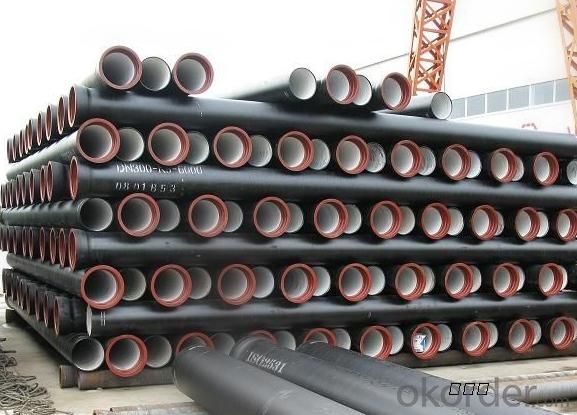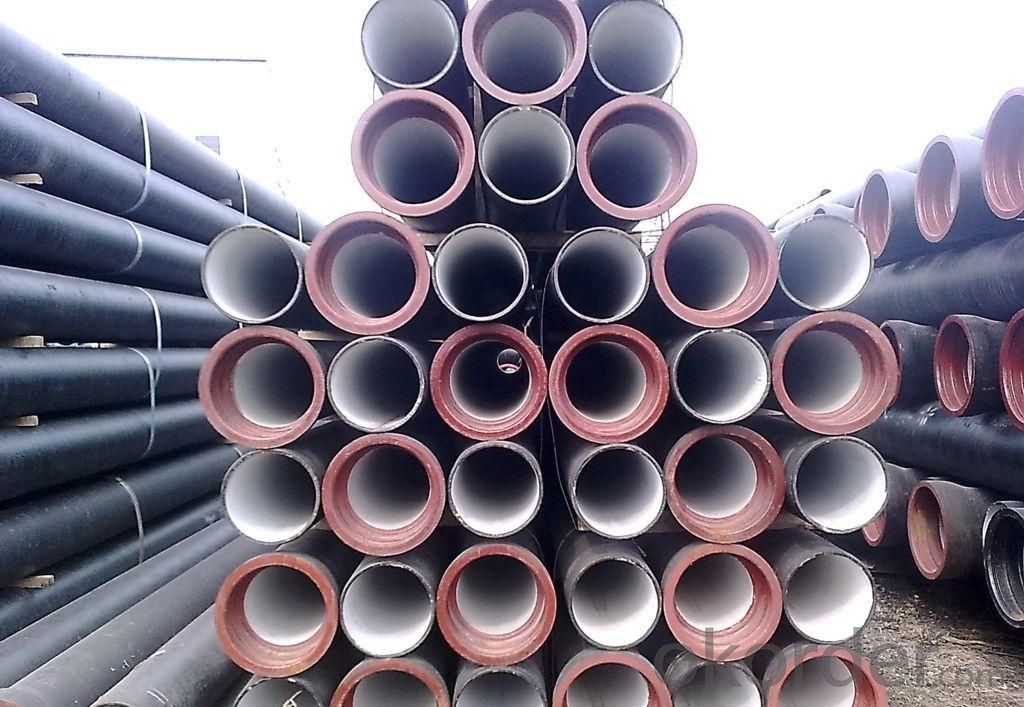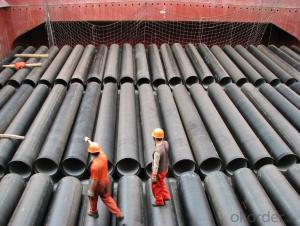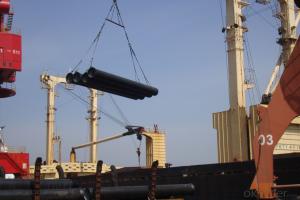Ductile Iron Pipe EN598 DN250 Class K9
- Loading Port:
- Tianjin
- Payment Terms:
- TT or LC
- Min Order Qty:
- 20 m.t.
- Supply Capability:
- 200000 m.t./month
OKorder Service Pledge
OKorder Financial Service
You Might Also Like
1,Ductile Iron Pipe Description :
DI pipe fittings are manufactured according to ISO 2531 or BS EN545 or BS4772 FOR POTABLE WATER ,internal is cement lining or wet epoxy coating;External is zinc plus bitumen or wet epoxy coating. We also manufacture ductile iron fittings with fusion bonded epoxy both inside and outside. All the producets are sutible to water pipes fields.
We have passed ISO9001,ISO14001,OHSMS18001 certificate.
2,Main Features of the Ductile Iron Pipe:
1).Quality guarantee
• Chemical checking
• NDE after rough machining
• Mechanical testing after heat treatment
• Final NDE,dimension inspected
2).Quality document
• Full Q.A document as per client request
3).Packing and Shipping
• standard export package(carton/wooden case/pallet)
• accept FOB,FAS,CNF,CIF door to door etc or customer designated shipping agent
4).Service
• Drawing: we can translate your original drawing, offer best suggestion on design
• Quality: we have full set quality control system to guarantee the best quality.
• Inspection: inspect in house, all our products must be checked 3 times before packing
3,Ductile Iron Pipe Images:


4.Ductile Iron Pipe Specification:
Surface Finishes: Bare, Oiled, Mill Varnish, Galv,FBE, FBE Dual, 3LPE, 3LPP, Coal Tar,Concrete Coating and Tape Wrap
End Finishes: Beveled, Square Cut, Threaded, hat
Additional Services: Internal Coating
Packaging: packed in bag, plastic bag, steel strip, steel wire,double wire, iron box, wooden box, tarpaulin, plastic sheeting
Inspection: MOODY SGS BV GL DNV ABS LIOYD’S
Test: X-ray, UT, magnetic particle,inspection,hydrostatic test.
Processing service: Beveling, Threading, Slotting, Cut-to length, Bends, Quench and Temper, Fabrication, Double-jointing and On-site assistance
Documentary: MTC, material certification,Origin certification, CI or PI,Test Report, export licence, handling order, B/L,insurance policy,shipping instructions, contract, packing list etc.
5.FAQ:
We have organized several common questions for our clients,may help you sincerely:
1.Q: Why would you choose ductile iron pipe rather than other pipe materials?
A:The reasons are obvious for that not only ductile iron pipe possesses the inherent strength and flexibility of ductile iron, combined with proven corrosion protection systems, but also the cost savings can be achieved from design to installation and commissioning.
2.Q:Why can you guarantee the inner of pipes can’t be corroded?
A: High alumina cement mortar lining and sulphate-resistant cement mortar lining. These two special linings are applicable to inner anti-corrosion for sewage pipes, improving resistance to erosion of the sewage components.
- Q:How much is the installation fee of the 400 largest ductile iron pipe?
- Compared with the PE pipe, from the installation time, ductile pipe PE pipe installation is simple and rapid, and after the installation of internal and external pressure bearing better tightness and corrosion resistance; from the point of view, ductile pipe sealing better after installation, but also can improve the corrosion resistance through various anti-corrosion methods;
- Q:How do ductile iron pipes handle ground settlement due to construction activities?
- Ductile iron pipes have the ability to handle ground settlement caused by construction activities due to their flexibility and strength. These pipes are designed to withstand external pressure and can accommodate minor ground movements without significant damage or failure. The ductility of the material allows the pipes to deform slightly, absorbing the ground settlement and preventing them from cracking or breaking. Additionally, the joints in ductile iron pipes are typically flexible, allowing for further movement and reducing the risk of leakage or structural issues. Overall, ductile iron pipes are well-suited for withstanding ground settlement and ensuring the integrity of the pipeline system during construction activities.
- Q:Can ductile iron pipes be used for underground chemical transport systems?
- Due to their strength, durability, and resistance to corrosion, ductile iron pipes are commonly utilized in a variety of applications. However, when considering their use in underground chemical transport systems, it is crucial to take certain factors into account. Firstly, it is necessary to evaluate the type of chemicals being transported. Although ductile iron pipes are generally resistant to a wide range of chemicals, including acids, alkalis, and organic solvents, there are some chemicals that can cause corrosion or react with the iron content of the pipes, leading to degradation and potential leakage. Therefore, it is essential to assess chemical compatibility and seek advice from chemical engineers or experts to determine if ductile iron pipes are suitable for specific chemical transport applications. Secondly, the concentration and temperature of the chemicals must be considered. Elevated temperatures and high concentrations of certain chemicals can accelerate the corrosion process, potentially compromising the integrity of the pipes. Therefore, it is crucial to evaluate the operating conditions and ensure that the ductile iron pipes can withstand the chemical concentration and temperature levels. Furthermore, the potential presence of abrasive or erosive chemicals needs to be taken into consideration. If the transported chemicals contain abrasive particles or possess erosive properties, it may cause increased wear and tear on the inner surface of the pipes, reducing their lifespan and potentially leading to leaks. In such cases, it may be more appropriate to use alternative materials with higher resistance to abrasion or erosion. Lastly, it is important to adhere to relevant regulations and standards. Different countries or regions may have specific requirements for underground chemical transport systems, including the selection of materials. Therefore, it is crucial to ensure that ductile iron pipes meet the necessary standards and are approved for use in such applications. In conclusion, while ductile iron pipes have many desirable properties for various applications, including underground use, their suitability for chemical transport systems is dependent on several factors. Before deciding to use ductile iron pipes for underground chemical transport systems, it is essential to carefully evaluate chemical compatibility, concentration and temperature levels, the presence of abrasive or erosive chemicals, and compliance with regulations. Seeking guidance from experts in the field is highly recommended to ensure the safety and effectiveness of the chosen piping material.
- Q:How do ductile iron pipes handle ground movement near rivers and lakes?
- Ductile iron pipes are highly suitable for handling ground movement near rivers and lakes. Their inherent flexibility and durability make them resistant to ground instability. They can withstand minor shifts and settle with the movement without cracking or breaking. Additionally, their sturdy construction and high tensile strength allow them to adapt to changing soil conditions, ensuring the integrity and longevity of the pipeline system in these areas.
- Q:Ductile iron pipe is flexible pipe or rigid pipe
- The flexible tube and you say should refer to the common steel pipe and seamless steel pipe, because the two are by the simple method according to the needs and the deformation, in other words, ductile iron is cast out without deformation.
- Q:Are ductile iron pipes suitable for use in mining applications?
- Yes, ductile iron pipes are suitable for use in mining applications. Ductile iron, also known as nodular cast iron, is a type of iron that has been treated with magnesium or cerium to alter its microstructure, making it stronger and more flexible than traditional cast iron. This enhanced strength and ductility make ductile iron pipes highly resistant to impact, corrosion, and abrasion, which are common challenges in mining environments. In mining applications, ductile iron pipes are often used for various purposes such as water supply, slurry transportation, and ventilation systems. Their excellent durability and resistance to wear and tear make them ideal for handling abrasive materials, chemicals, and high-pressure fluids commonly found in mining operations. Furthermore, ductile iron pipes' ability to withstand heavy loads and external pressures makes them suitable for underground mining applications, where they may need to support the weight of overlying rock layers. Their high tensile strength and flexibility help prevent pipe failure and minimize the risk of leaks or breaks, ensuring the safety and efficiency of mining operations. Additionally, ductile iron pipes are relatively easy to install, maintain, and repair. They can be welded or joined using mechanical couplings, allowing for quick and efficient installation in mining sites. Their corrosion resistance also reduces the need for frequent maintenance and replacement, resulting in cost savings for mining companies. Overall, the superior mechanical properties and durability of ductile iron pipes make them a reliable and practical choice for use in mining applications.
- Q:Can ductile iron pipes be used for above-ground installations?
- Yes, ductile iron pipes can be used for above-ground installations. They have excellent strength and durability, making them suitable for various applications, including above-ground installations where corrosion resistance and structural integrity are required.
- Q:Are ductile iron pipes resistant to UV degradation?
- UV degradation is not something that ductile iron pipes naturally resist. When they are exposed to sunlight, the UV radiation can cause degradation in various materials, including ductile iron. However, it is important to understand that the rate at which ductile iron pipes degrade due to UV radiation is relatively slow when compared to materials like plastics or rubber. To prevent UV degradation from negatively impacting ductile iron pipes, protective actions can be taken. These can include coating the pipes with a paint that is resistant to UV radiation or applying an external protective layer. By doing so, the impact of UV radiation can be minimized. Additionally, proper installation and maintenance practices can also contribute to the longevity and durability of ductile iron pipes. It is worth noting that while UV degradation may not be the main concern for ductile iron pipes, other factors like corrosion, chemical attack, or mechanical stress can still affect their performance and lifespan. Therefore, it is important to consider all potential environmental factors and take appropriate protective measures accordingly.
- Q:What is a graphite cast iron pipe?
- It should be the ductile iron pipe. You can check it again.
- Q:How does ductile iron pipe resist internal corrosion?
- Ductile iron pipe resists internal corrosion through a combination of its unique material properties and protective coatings. Firstly, ductile iron, also known as nodular cast iron, is made by adding magnesium to molten iron, which causes the graphite in the material to be nodular or spherical in shape. This results in a more flexible and elastic material compared to traditional cast iron, making it less prone to cracking or fracturing under stress. Additionally, ductile iron has a dense, microstructure with a high carbon content, which acts as a barrier to prevent corrosive elements from penetrating the pipe's surface. This inherent resistance to corrosion makes ductile iron pipe suitable for carrying various fluids such as water, sewage, and chemicals without the risk of degradation over time. Furthermore, ductile iron pipes are often internally lined with protective coatings to further enhance their resistance to corrosion. These coatings, such as cement mortar or epoxy, create a barrier between the pipe's surface and the fluid it carries, preventing direct contact and reducing the likelihood of corrosion. These linings are applied during the manufacturing process, ensuring a consistent and durable protection throughout the entire length of the pipe. In summary, ductile iron pipe resists internal corrosion due to its material composition, including the nodular graphite structure and high carbon content, as well as the application of protective coatings. This combination of factors ensures the longevity and reliability of ductile iron pipes in various applications, even in corrosive environments.
1. Manufacturer Overview |
|
|---|---|
| Location | |
| Year Established | |
| Annual Output Value | |
| Main Markets | |
| Company Certifications | |
2. Manufacturer Certificates |
|
|---|---|
| a) Certification Name | |
| Range | |
| Reference | |
| Validity Period | |
3. Manufacturer Capability |
|
|---|---|
| a)Trade Capacity | |
| Nearest Port | |
| Export Percentage | |
| No.of Employees in Trade Department | |
| Language Spoken: | |
| b)Factory Information | |
| Factory Size: | |
| No. of Production Lines | |
| Contract Manufacturing | |
| Product Price Range | |
Send your message to us
Ductile Iron Pipe EN598 DN250 Class K9
- Loading Port:
- Tianjin
- Payment Terms:
- TT or LC
- Min Order Qty:
- 20 m.t.
- Supply Capability:
- 200000 m.t./month
OKorder Service Pledge
OKorder Financial Service
Similar products
New products
Hot products
Related keywords


























